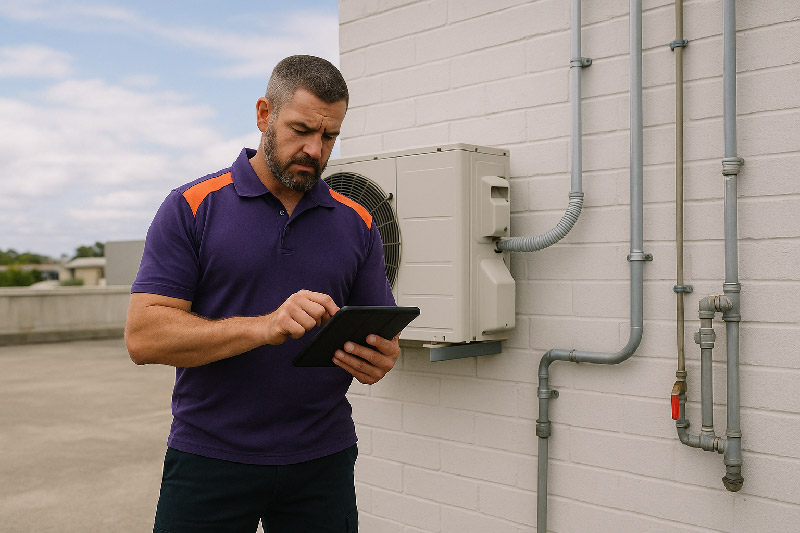Navigating the Complexities of HVAC Procurement: Best Practices for 2023

In the ever-evolving landscape of modern industries, the procurement process plays a pivotal role in determining the success of businesses. This is particularly true in sectors heavily reliant on specialized equipment and services, such as the Heating, Ventilation, and Air Conditioning (HVAC) industry. As technology advances and environmental considerations become paramount, the efficient acquisition of HVAC systems and components becomes increasingly vital. This article aims to delve into the complexities of HVAC procurement, shedding light on best practices that hold particular relevance in the year 2023.
Commercial HVAC procurement refers to the comprehensive process of acquiring the necessary heating, ventilation, and air conditioning systems, equipment, and services for residential, commercial, and industrial purposes. In an industry where indoor comfort, energy efficiency, and environmental impact are closely intertwined, the procurement of HVAC solutions is far from a routine transaction. It involves a meticulous interplay of factors that span from cost-efficiency and quality assurance to the timely acquisition of resources.
Achieving a delicate equilibrium between cost-efficiency, uncompromised quality, and timely procurement is the crux of successful HVAC acquisition. Cost-efficiency is a driving force for businesses aiming to remain competitive, but it must not come at the expense of subpar equipment that could compromise long-term performance and customer satisfaction. Simultaneously, the prompt procurement of HVAC components is crucial, especially considering the rapid pace of technological advancements that can render certain solutions obsolete in a short span of time.
Understanding the Basics of HVAC Procurement
HVAC procurement encompasses a wide spectrum of activities required to identify, select, and obtain the necessary systems and services that regulate indoor environments. Its role extends beyond transactional exchanges; it is a strategic process that impacts a company’s operational efficiency, sustainability, and bottom line.
Strategic HVAC procurement can not only optimize costs but also align the business with cutting-edge technologies and best practices.
HVAC procurement encompasses both tangible equipment and intangible services. On the equipment front, it involves sourcing heating, cooling, and ventilation systems that adhere to energy efficiency standards, durability, and operational effectiveness. This could range from advanced heat pumps and air conditioning units to ventilation ducts and smart thermostats.
In parallel, the procurement of services such as maintenance, repairs, and system optimization plays a crucial role in ensuring the longevity and efficiency of HVAC systems.
Strategic HVAC procurement transcends a mere transactional approach. It involves aligning procurement decisions with long-term business goals and industry trends. By adopting a strategic mindset, businesses can leverage procurement to gain a competitive edge. This might involve forming partnerships with innovative suppliers, embracing sustainable technologies, and streamlining the supply chain to reduce lead times.
Key Considerations in HVAC Procurement
When embarking on the journey of HVAC procurement, several critical factors come into play that can significantly impact the overall success and effectiveness of your HVAC systems. Let’s delve into some of the key considerations that should guide your decision-making process:
Quality vs. Cost: Striking the Right Balance
One of the most fundamental dilemmas in HVAC procurement is the trade-off between quality and cost. While it’s tempting to prioritize cost savings, compromising on quality can lead to a host of issues down the road. Low-quality HVAC equipment may not perform optimally, resulting in inefficiencies, higher energy bills, and frequent breakdowns. The initial savings can quickly be eclipsed by the long-term costs of maintenance and replacements.
On the other hand, investing in high-quality HVAC systems might incur a higher upfront cost, but it often pays off in terms of better energy efficiency, reliable performance, and a longer operational lifespan. The key is to find the right balance that aligns with your budget constraints while ensuring that the chosen equipment meets the necessary standards for efficiency, durability, and performance.
Supplier Relationships: The Power of Partnerships
Just like your customers, building and nurturing strong relationships with HVAC suppliers cannot be overstated. A collaborative partnership with suppliers can yield numerous benefits, including access to the latest industry insights, innovative technologies, and preferential terms. Engaging in open communication and transparency with suppliers can also provide you with a competitive edge, as they might be more willing to accommodate your specific needs and preferences.
Moreover, a robust supplier relationship can contribute to a smoother procurement process. Suppliers who understand your requirements can provide tailored solutions, saving you time and effort in researching and evaluating options. Regular engagement and feedback mechanisms can foster a sense of mutual trust, ensuring that you’re kept informed about updates, improvements, and potential challenges.
Warranty and Support: Safeguarding Your Investment
In the world of HVAC procurement, service warranties and post-purchase support play a pivotal role. A comprehensive warranty not only demonstrates the manufacturer’s confidence in their product but also provides you with a safety net against potential defects and malfunctions. Before finalizing a purchase, carefully review the warranty terms, duration, and coverage. Be sure to clarify what types of maintenance or usage conditions might void the warranty.
Equally important is the availability of post-purchase support. HVAC systems require periodic maintenance and occasional troubleshooting. Ensuring that the supplier offers accessible and responsive customer support can save you from frustrating experiences and prolonged downtime in case issues arise.
Strategies for Effective HVAC Procurement
Navigating the realm of HVAC procurement with finesse requires a strategic approach that takes into account various factors. Here are three key strategies that can greatly enhance the effectiveness of your HVAC procurement process:
Market Research: Insight into Trends, Prices, and Innovations
In the rapidly evolving HVAC landscape, staying informed about market trends, pricing fluctuations, and technological innovations is paramount. Conducting thorough market research provides you with valuable insights into the current state of the industry. This knowledge enables you to make informed decisions about the types of systems, components, and services that best align with your needs and budget.
Market research also helps you anticipate shifts in demand and supply, allowing you to time your procurement efforts for maximum advantage. By staying ahead of emerging technologies and sustainable practices, you can future-proof your HVAC investments and make choices that resonate with industry standards and customer expectations.
Bulk Purchasing: Capitalizing on Cost Savings and Benefits
Bulk purchasing is a strategy that can yield significant cost savings in HVAC procurement. When you purchase equipment, components, or services in larger quantities, suppliers often offer preferential pricing due to the promise of consistent business. This can lead to lower per-unit costs and potentially reduce the impact of price fluctuations over time.
Bulk purchasing also streamlines the procurement process. Instead of engaging in multiple transactions for individual items, you can consolidate your orders, saving time, effort, and administrative resources. Additionally, having surplus components on hand can help mitigate downtime in case of unexpected failures, contributing to operational continuity.
Negotiation Skills: Securing Favorable Terms and Prices
Effective negotiation skills are a cornerstone of successful HVAC procurement. Negotiating with suppliers allows you to achieve favorable terms, prices, and conditions that align with your organization’s goals and budget constraints. Prior to entering negotiations, ensure that you are well-versed in market trends, competitive offerings, and the specific needs of your project.
During negotiations, focus on building a mutually beneficial relationship. Understand the value proposition you bring as a customer and communicate your requirements clearly. Be prepared to explore concessions, specifications, and compromises that can result in win-win outcomes. Effective negotiation isn’t just about driving prices down; it’s about finding common ground that respects the interests of both parties.
Leveraging Technology in HVAC Procurement
In the realm of HVAC procurement, technology has emerged as a powerful ally, revolutionizing the way businesses manage their supply chains.
Digital platforms and software play a pivotal role in streamlining procurement processes. These tools facilitate efficient supplier management by centralizing communication and document sharing, enhancing collaboration and reducing manual paperwork. Additionally, they enable real-time order tracking, ensuring transparency and timely deliveries. Inventory management software optimizes stock levels, minimizing excess or shortage issues.
Advanced analytics provide insights into market trends, supplier performance, and cost fluctuations, aiding in making informed decisions. Real-time data empowers procurement professionals to adapt swiftly to changing circumstances and seize profit and cost-saving opportunities. Overall, technology transforms procurement from a transactional process into a strategic advantage, enhancing efficiency, reducing errors, and enabling organizations to optimize their construction HVAC systems while staying aligned with industry trends and customer needs.
Navigating Challenges in HVAC Procurement
HVAC procurement faces a multitude of challenges that demand adept navigation for successful outcomes. Global supply chain disruptions, triggered by factors like pandemics or geopolitical tensions, can lead to delays, shortages, and price fluctuations in HVAC equipment and components. Adapting contingency plans and diversifying suppliers become crucial strategies to mitigate these risks.
Adhering to regulatory compliance is paramount in HVAC procurement due to safety, environmental, and performance standards. Non-compliance can result in legal repercussions and subpar system performance, underscoring the need for meticulous vetting of suppliers and products.
As environmental concerns rise, sustainable procurement practices gain prominence. Sourcing energy-efficient systems, eco-friendly materials, and products with minimal carbon footprints aligns with sustainability goals and customer expectations.
Navigating challenges in HVAC procurement demands strategic resilience to address disruptions, vigilance in regulatory adherence, and a commitment to sustainable practices that not only mitigate risks but also contribute to long-term success in a rapidly evolving industry.
Building Long-Term Procurement Strategies
Forecasting and long-term planning form the bedrock of effective HVAC procurement strategies. By analyzing historical data, market trends, and industry developments, businesses can anticipate their future HVAC needs. Long-term planning enables the identification of upcoming projects, expansions, or replacements, allowing ample time for research, negotiation, and decision-making. This is also beneficial to your HVAC contractors and team members, contributing to long-term loyalty.
In the dynamic landscape of HVAC technology and market shifts, flexibility and adaptability are paramount. Procurement strategies must be agile enough to accommodate unforeseen changes, such as supply chain disruptions or shifts in customer preferences. Building relationships with multiple suppliers, maintaining diverse sourcing options, and remaining informed about emerging technologies bolster adaptability.
A future-ready procurement plan aligns with business goals, industry trends, and sustainability objectives. Collaborate with cross-functional teams to determine the HVAC solutions that best suit operational needs and align with overarching strategies. Consider energy efficiency, sustainability, and total cost of ownership when evaluating options.
Leverage digital tools and analytics for real-time insights for your operations into market trends, supplier performance, and cost dynamics. By integrating these insights into your plan, you can proactively adjust strategies to seize opportunities and mitigate risks.
Conclusion: Master the HVAC industry
In the complex landscape of HVAC procurement, a strategic approach is essential for successful outcomes. This article has explored the multifaceted world of HVAC acquisition, highlighting key considerations, strategies, and challenges.
Key takeaways include:
- Balancing Act: HVAC procurement demands a delicate balance between cost-efficiency, quality, and timely acquisition. Prioritizing quality and aligning with budget constraints is crucial for long-term success.
- Strategic Procurement: Strategic procurement goes beyond transactional processes. It involves understanding market trends, building strong supplier relationships, and leveraging technology for optimal decisions.
- Technology’s Role: Digital platforms, software, and real-time data analytics streamline procurement, enhance supplier management, and provide insights for informed choices.
- Challenges and Adaptability: Address challenges like supply chain disruptions, regulatory compliance, and sustainability. Flexibility and adaptability are vital in navigating the changing procurement landscape.
In conclusion, adopting strategic, informed, and flexible HVAC procurement practices is imperative for thriving in this evolving industry. As you embark on this journey, remember that success lies in making well-informed decisions that align with your organization’s goals and industry trends.
Explore FieldInsight for further insights and solutions tailored to your HVAC procurement needs.
Our expertise can guide you toward optimizing your procurement processes and achieving excellence in HVAC systems acquisition.
What You Should Do Now
- Book a Demo. You’ll be in touch with an automation expert who has worked in this space for over 5 years, and knows the optimal workflow to address your needs.
- If you’d like access to free articles about managing HVAC workflows, go to our blog.
- If you know someone who’d enjoy reading this page, share it with them via email, Linkedin, Twitter, or Facebook.






